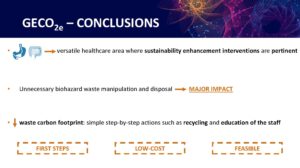
Simple actions can significantly reduce the carbon footprint of endoscopies, according to a new study presented at Digestive Disease Week® (DDW) 2022.
“Sustainable endoscopy remains a largely unaddressed issue,” said João A. Cunha Neves, MD, lead researcher on the study and gastroenterology resident at University Hospital Center of Algarve, Portimão in Portugal. “Our study showed that education and proper waste segregation are low-cost, feasible options than can turn endoscopy into a more sustainable practice.”
Dr. Cunha Neves and colleagues conducted a prospective interventional study at their center to reduce the endoscopy waste-related carbon footprint and waste-processing costs. After a pre-study audit period, the researchers implemented a two-fold intervention consisting of:
- Educating the entire staff on proper waste sorting and disposal.
- Reorganizing the endoscopic unit to bring in additional recycling bins and remove surplus biohazard waste bins.
The researchers based their intervention on published recommendations for waste reduction in endoscopy units. Importantly, the interventions did not interfere with daily workflow or productivity.
Many staff members were incorrectly treating all personal protective equipment and endoscopic disposables as biohazard waste, researchers found. Biohazard waste disposal costs more and produces approximately three times the amount of carbon emissions as landfill waste disposal.
As a result of the intervention, “Even though the amount of waste didn’t decrease that much, the correct classification had a big impact on the carbon footprint and cost,” said Dr. Cunha Neves.

Key results from the study include:
- Total waste did not significantly change.
- There was a significant reduction in biohazard waste.
- The amount of recycled paper and plastic increased.
- Costs associated with waste processing decreased.
Dr. Cunha Neves provided advice to those seeking to reduce carbon emissions in their units:
- Include the entire staff in education and awareness efforts but assign an individual or team to champion your program.
- Search the literature for guidelines and recommendations on waste sorting and recycling.
- Prioritize the use of reusable devices.
- Establish recycling streams within the unit.
- Assess and monitor your processes to determine the impact of behavior changes.
Dr. Cunha Neves gave the oral presentation, “Green endoscopy to reduce CO2e generated by endoscopic waste—GECO2e” on Saturday, May 21, at 10:40 a.m. PDT as part of the session “Infection and Optimizing Controls in ENDO Centers.”


